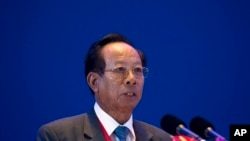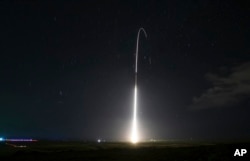Cambodian Defense Minister Tea Banh said last week there was little Cambodia could do about the United States’ purported plan to deploy intermediate-range missiles in Asia, noting the country was stay away from the issue.
The United States recently pulled out of the 1987 Intermediate-Range Nuclear Forces (INF) agreement with the then-Soviet Union, banning land-deployment of missiles able to reach 500 to 5,500 kilometers. The U.S. said that Russia’s failure to honor the agreement was the reason for its withdrawal from the INF.
After leaving the agreement, the Associated Press reported a senior U.S. diplomat saying that US-allied countries were being consulted on the purported deployment, most likely including Japan, Australia and South Korea (Republic of Korea).
Tea Banh, who is also deputy prime minister, said it was for the U.S. and its allies to agree on the issue, and did not want to impinge on their sovereignty or rights.
“In Cambodia, we have our law that stipulates clearly that such deployment and having a [foreign] military base will be absolutely impossible,” Tea Banh said in a phone interview with VOA Khmer. “But for other countries, it is difficult for me to express my opinion on their behalf. I dare not violate their rights and sovereignty, and I am not going to interfere in their decision.”
Tea Banh claimed that it wasn’t unusual for the U.S. to want to deploy weapons across the world because it had a track record of doing so.
The development comes as questions have been raised over Cambodia’s claims of sovereignty, following a Wall Street Journal story, which reported that the country had plans allegedly to allow the Chinese military to use the Ream Naval Base in Preah Sihanouk province. The Cambodian government denied the claims in the story, pointing to a constitutional provision that prevents foreign military presence on Cambodian soil.
Earlier this month, the U.S. officially pulled out of the INF agreement, nearly six months after signaling its intention to leave the three-decade long treaty. The U.S. alleged that Russia was violating the agreement, a claim the Russians have denied, instead saying the U.S. was only using it as an excuse to leave the treaty.
“The United States will not remain party to a treaty that is…violated by Russia,” Secretary of State Mike Pompeo said in a statement. “Russia is solely responsible for the treaty’s demise.”
The end of the INF agreement may herald a precarious period for the Asia-Pacific region, which is at the frontlines of the United States’ efforts to counter growing Chinese influence in the region. This includes the United States’ opposition to Chinese military installations in the contested waters of the South China Sea and, in Cambodia, attempts to reduce China’s growing economic and diplomatic influence.
Chheang Vannarith, a professor and Cambodian observer of Asian affairs, said the move seemed less about Russia’s infractions and more about countering China in the region. However, the development, he said, could trigger a “missiles race” between the U.S. and China.
“I think China will react strongly to this issue and deploy its missiles in the South China Sea, on artificial islands that China has created in recent years,” said Chheang Vannarith, president of a new think-tank, Asian Vision Institute, which is based in Phnom Penh.
Dr. Zachary Abuza, professor at the National War College in Washington D.C. and an author of books about Southeast Asia, told VOA Khmer by email that the “terrible” move would undermine regional security, especially for U.S. allies, and would test already-strained relationships with these countries.
“If the US goes to the [Republic of Korea] and Japan and starts negotiations with them about deploying IRBMs, then there will be added pressure on the alliances, which are already under strain,” Dr. Abuza said, referring to intermediate-range ballistic missiles.
“I imagine public pressure against the basing of IRBMs will be very real.”








